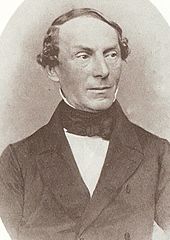Chief President
Oberpräsident (actually: Oberregierungspräsident ) was the official title of the highest administrative officer in the Prussian provinces . Despite unclear and changing competencies, the office of an administrative lawyer was the culmination of a career. As often as senior presidents were appointed to political leadership roles, so often dismissed politicians were given the honorable office.
history
The chief president of a Prussian province was the highest representative of the Prussian crown in the province. As early as the 17th and 18th centuries he was appointed by the elector or king and was only responsible to him.
From 1808 and 1815 the high president exercised the right of inspection, the supreme supervision of the administration in his province, on behalf of the king. However, he was not the superior of the regional presidents , who were directly subordinate to the Prussian Ministry of the Interior in Berlin. The high president had the right to be informed by the regional president about all matters of the province, he was able to inspect all administrative processes and was allowed to intervene himself in case of danger. He exercised an important rule of law control over the district president and the administration . He had immediate law and was only subordinate to the Prussian Prime Minister. Only a small staff of employees was available to him to carry out his task. In terms of duties and powers, he was the civil equivalent of a Prussian general stage manager .
In addition to the upper and regional presidents, the highest officials of the provincial association were the provincial governors , who exercised the self-government powers of the provinces and were elected by the provincial parliaments.
Under National Socialism , the powers of the upper presidents were expanded. They then also perceived imperial interests, similar to the powers of an imperial governor . The Prussian Provincial Council was also set up as an advisory body . The conflict between the powers of the Oberpräsident and the district president was not resolved until 1945.
Seats of the Prussian upper presidents
The Prussian upper presidents had their seat in the following provincial capitals:
- Berlin - Province of Brandenburg , from 1939 "Province of Mark Brandenburg" (1920–1945)
- Breslau - Province of Silesia (1815–1919, 1938–1941), Province of Lower Silesia (1919–1938, 1941–1945)
- Charlottenburg - Brandenburg Province (1918–1920)
- Danzig - West Prussia Province (1815–1829, 1878–1920)
- Halle ad Saale - Province of Halle-Merseburg (1944–1945)
- Hanover - Province of Hanover (1866–1945)
- Kassel - Province of Hessen-Nassau (1866 to 1944), Province of Kurhessen (1944–1945)
- Katowice - Upper Silesia Province (1941–1945)
- Kiel - Schleswig-Holstein Province (1866–1879, 1917–1945)
- Koblenz - Province of the Grand Duchy of Lower Rhine (1815 / 16–1824), Rhine Province (1824–1945)
- Cologne - Province of Jülich-Kleve-Berg (1815 / 16-1824)
- Königsberg (Pr) - Province of Prussia / East Prussia (1815–1945)
- Magdeburg - Province of Saxony (1815–1944), Province of Magdeburg (1944–1945)
- Munster i. Westf. - Province of Westphalia (1816–1945)
- Opole - Upper Silesia Province (1919–1938)
- Poznan - Poznan Province (1815-1920)
- Potsdam - Province of Brandenburg (1815-1918)
- Schleswig - Province of Schleswig-Holstein (1879–1917)
- Sigmaringen (district president with the powers of an upper president) - Hohenzollernsche Lande (1850-1945)
- Schneidemühl - Grenzmark Province of Posen-West Prussia (1922–1938)
- Szczecin - Pomerania Province (1815–1945)
- Wiesbaden - Nassau Province (1944–1945)
Berlin
The Lord Mayors of Berlin had been on an equal footing with the Lord Presidents since 1881.
literature
- J. Rüdiger Döhler : Pillars of Prussia - [59] Corps students as senior presidents of Prussian provinces . In: then and now. Yearbook of the Association for Corporate Student History Research , ISSN 0420-8870 , vol. 55 (2010), pp. 143–148.
- Horst Möller : The Prussian upper presidents of the Weimar Republic . (PDF; 7.9 MB). In: Vierteljahrshefte für Zeitgeschichte , 1982
- Klaus Schwabe (Ed.): The Prussian Oberpräsident 1815–1945 (= German ruling classes in modern times. Vol. 15 = Büdinger research on social history. 1981). Boldt, Boppard am Rhein 1985, ISBN 3-7646-1857-4 .
Web links
- Ansgar Weisser: The Upper President. In the Westfälische Geschichte Internet portal , last accessed on October 6, 2017


